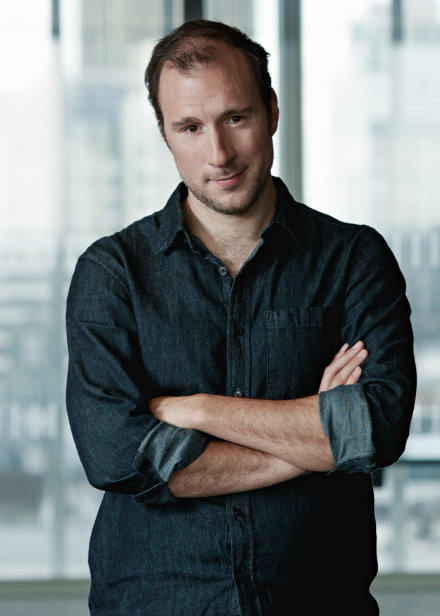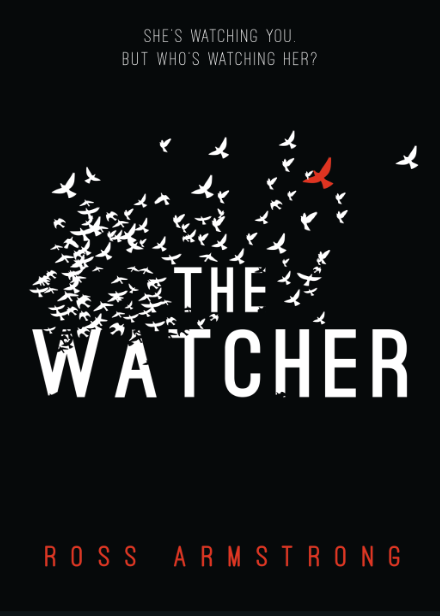Ross Armstrong
 Ross Armstrong is a British stage and screen actor who has performed in the West End of London, on Broadway and in theatres throughout the UK. Among others, he has acted opposite Jude Law (Hamlet), Joseph Fiennes (Cyrano de Bergerac), Kim Cattrall (Antony and Cleopatra) and Maxine Peake (The Deep Blue Sea). His TV appearances include Foyle’s War, Jonathan Creek, Mr Selfridge, DCI Banks and most recently, Ripper Street. After gaining a BA in English Literature and Theatre at Warwick University, Ross joined the National Youth Theatre where his contemporaries included Matt Smith and Rafe Spall. A three year course at RADA followed and whilst there he won the RADA Poetry Writing Award. The idea for his debut novel ‘The Watcher’ came to him when he moved into a new apartment block and discovered whilst looking at the moon through binoculars that he could see into his neighbours’ homes.
Ross Armstrong is a British stage and screen actor who has performed in the West End of London, on Broadway and in theatres throughout the UK. Among others, he has acted opposite Jude Law (Hamlet), Joseph Fiennes (Cyrano de Bergerac), Kim Cattrall (Antony and Cleopatra) and Maxine Peake (The Deep Blue Sea). His TV appearances include Foyle’s War, Jonathan Creek, Mr Selfridge, DCI Banks and most recently, Ripper Street. After gaining a BA in English Literature and Theatre at Warwick University, Ross joined the National Youth Theatre where his contemporaries included Matt Smith and Rafe Spall. A three year course at RADA followed and whilst there he won the RADA Poetry Writing Award. The idea for his debut novel ‘The Watcher’ came to him when he moved into a new apartment block and discovered whilst looking at the moon through binoculars that he could see into his neighbours’ homes.
- To the readers of the blog, that may not be familiar with you or your writing, can tell us a bit about yourself and how you got into writing?
I studied English Literature at Warwick University and acting at RADA and for the past ten years have been an actor in TV shows like ‘Ripper Street’, ‘Foyles War’ and ‘Jonathan Creek’, and on stage with the RSC amongst others. But I’d always kept writing in one capacity or another. Finishing a book was something I only managed to get the time and mental alacrity to do a few years ago. Then I threw that one away and wrote a better one. I was lucky to have a lot of interest in it, the wonderful literary agent Juliet Mushens took it on and it’s being published by HQ (Harper Collins) in the UK and Harlequin in the US. And is being translated into many languages including, most recently confirmed, Hebrew. - Where do you get your ideas for your stories?
I’ve been thinking recently that crime stories are tales told backwards. I don’t know whether this has been said before and more eloquently, but I feel like someone like Chekhov told stories by showing you the surface and then delving into its darker elements, crime stories start with darker elements and then try and reel back and show you the seemingly innocuous surface. With ‘The Watcher’ I came to a way of doing things which starts with creating a setting and a motive which has some kind of resonance to modern trends, like the gentrification of London in this case, and then tried to figure out the most enjoyable and instructive way to tell that story structurally.In this case, we go in at the middle. Then go back to the start. Then move past the middle and drive on to the end. But then the process of writing any novel is all about dashing around in terms of timeline. The challenge I set myself was to do that in a clear but beguiling way, and by staying with one viewpoint while I did that. Creating an obsessive tension caused by never moving from a close up on the central character. Like a movie like ‘Buried’, or even ‘Son of Saul’ does.
As for figuring out where that original idea comes from, usually I see an image, in this case the view of a distant apartment from mine and then figure out a plot point, from there I imagine a character that might do the most interesting thing with that plot. Then go from there.
- Was there ever a book that you read, that didn’t live up to the hype that surrounded it and left you disappointed?
Firstly, I just love reading, I write in my second book about the pure process of reading is enjoyable in a way that watching a screen can never be, somehow chemically, something my central character can never have, because he can’t read. That’s a long winded way of saying I almost always enjoy a novel. I do however often have trouble with short stories. I’m sure it’s my particular view on things, but I feel like I don’t understand the format. So often stories from the American short story tradition leave me cold. However, I’m enjoying Shirley Jackson’s collection ‘Dark Tales’ and I loved David Eagleman’s ‘Sum’, a series of virtually one page visions of the afterlife written by a neuroscientist. I love Eagleman and he’s been a big influence on my next book. - If you were starting your writing journey again, would you do anything differently?
I suppose I would’ve started writing thrillers earlier because I feel I’ll never have enough time in my life to experiment with all the stories I have in my head in the genre, and to read all the wonderful books out there, in all genres, that I want to. I really get so inspired by other writers, the choices they make that take you out of your usual way of doing things. - Why did you decide that you wanted to write crime?
It took a while for me to realise it was my favourite genre. I think it has a simplicity but sense of constant mystery which I can’t stop going back to the well for. My favourite movies are mostly Hitchcock or David Fincher movies, and I wanted to see whether I could write something that people couldn’t help but consume, but also has a kind of weight to it that those directors, and writers like Gillian Flynn and Harlan Coben create too. - What do you think makes a good crime book?
I think there is a point where story relevance meets absolute irrelevance, in terms of pure enjoyment and escapism. If that’s not too elliptical. I think a lot of my favourite crime writers seem to do that naturally. - From books and films, who has been your favourite bad guy?
Great question. John Doe in Seven comes to mind. The way he comes into the story. The absolute relentless darkness. So brilliant, empty, unusual, and superbly played by Kevin Spacey. - If you were to start your own bookclub, what authors would you ask to join?
Chuck Palahniuk, Teju Cole, Stephen King, Lee Child, Jessie Burton, Deborah Levy, Paul Beatty, Harlan Coben, Gillian Flynn, Hugh Laurie, Jonathan Franzen, Ottessa Moshfegh, Patti Smith, Haruki Murakami, Lena Dunham, the poets Derek Walcott, Kate Tempest and Adam O’Riordan, the ghosts of Patricia Highsmith, John Williams, Charles Bukowski and Phillip K. Dick. I think we’d have a good time. - If you were stranded on a desert island, which three books would you bring with you to pass the time?
‘Stoner’ by John Williams. ‘Freedom ‘by Jonathan Franzen. ‘The Infinite Jest’ by David Foster Wallace; at over a thousand pages it’s probably the perfect length for the occasion. - What area do you suggest a budding writer should concentrate on to further their abilities?
Throw out the idea of writing a great line. Come up with a great structure. Test it over and over again. Chip away at it until it’s a perfect statue. Make sure it’s clear but surprising. Then write a clear and surprising first chapter. Re draft it a hundred times until it’s the most clear and surprising and enticing and true to you it can be. - When sitting down to write, what is the one item you need beside you?
I can start writing anywhere, then I kind of wake up eight hours later, like someone that can fall asleep anywhere. It’s very weird. But I also need coffee and water to make it happen. - And finally Ross do you have any projects or releases on the horizon which you would like to share with the readers of the website?
I’m in a great TV show called ‘Will’ about the early writing years of William Shakespeare, made by TNT, which will be arriving soon in 2017. It’s a spikey, punk version of his life, but I play the least rock n’roll character of all time, and I loved every second of it.Then I’m working on my second book which is about a man who survives being shot in the head, leaving his brain irrevocably altered, and how he awkwardly tries to solve a crime no one has asked him to get involved in, while negotiating a new way of looking at the world. It’s ‘The Man Who Mistook His Wife For A Hat’ meets ‘Seven’.
[amazon_link id=”0008181187″ target=”_blank” ] [/amazon_link]
[/amazon_link]
Follow Ross Armstrong on Twitter Ross Armstrong for updates
Leave a Reply